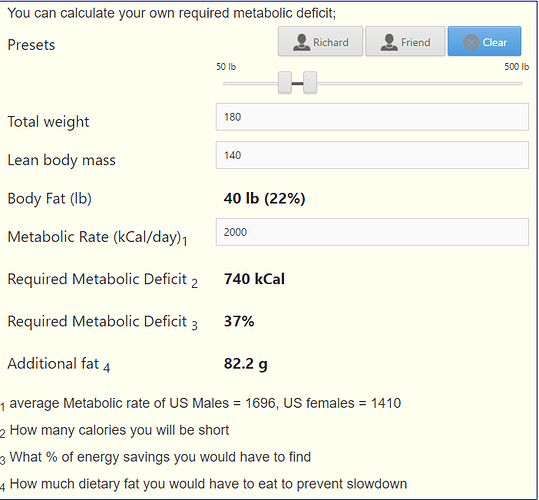Relating it to the chart, it sort of gives you an idea of where you currently fall, so how much of your energy is obtained from fat and how much you need to eat.
Assuming a normal metabolic rate, BF% etc. which of course will make the end result an estimate:
This means if your metabolic rate is 2,000 calories a day, your body fat will produce 1,260 (2,000-740) which means 740 calories, or 37% of your total needs to come from outside your body. Looking at the chart that would suggest you are in his Adjust area right now. This means you need to consume 740 calories of some type. Let’s assume you eat 10 carbs which is 40 calories so we get a nice round 700 remaining. Converting 140 pounds to kilo’s we get 63.5. This is again up to you and your body/goals but a recommended amount of protein is .8-1 gram per kilo of lean mass, lets just plug in 1 which is 63.5 grams of protein which in turn is 254 calories. This means you have 446 calories you need to consume, we have hit our protein goal and carb limit, that means fat needs to be the rest. 446/9 gives us 49.5 grams of fat.
This of course isn’t too accurate because we don’t know your metabolic rate, your desired protein intake, of course the margin of error of the study etc. but you can play around with the numbers to find what is right for you.
Since you seem to know your weight and LBM, all you need to do is play around with the metabolic rate, this is something that will be mostly trial and error, without having it measured you are just making guesses. The “Required Metabolic Deficit” will tell you how many calories need to come from outside your body. Any of the 3 macro’s can work, but the main point of the ketogenic diet is to control insulin levels, so from our point of view fat would be the best, protein next, and carbs of course would be the worst. Typically fat is more satiating, but may not be for you, so you may choose to eat mostly protein instead of fat, especially if GNG doesn’t worry you. If you plan to lift a lot of weights and are worried about muscle, taking protein over 1 is fine, the .8-1 is just an estimated range.
Knowing that most people here have a carb limit and a protein goal, and also want to impact insulin the least, the general desire is to fill the rest with fat once you have reached your other macro goals. If you are 300 calories away from your goal, but have met your protein goal and are under your carb limit, not eating is fine. If you are 300 calories short but it was mostly fat, you could be well short of your protein goal and may want to eat anyway.


